Rethinking local economies – five key takeaways from our latest Global Executive Live Panel
At a time when councils are being asked to do more with less, financial sustainability has become a defining challenge for local government.
That was the clear theme of the latest Global Executive Live Panel – a collaboration between the Local Government Information Unit (LGIU) and the Victorian Local Governance Association (VLGA) – where council chief executives and policy experts from the UK and Australia came together to reflect on shared pressures, policy innovation, and community-driven solutions.
The panel event on 22 July discussed inclusive local economic growth, and our speakers were:
- Dr Angela Jackson, Commissioner (Social Policy), Australian Productivity Commission
- David Marlow, Chief Executive, Third Life Economics
- Merryn Tinkler, Manager Economy & Culture, Mount Alexander Shire Council
- Rob Huntington, Chief Executive, Rossendale Borough Council
Five key takeaways: from conversations to insights
1. Localism is wellbeing. From Victoria to Lancashire, the challenges – and many of the solutions – are shared. Merrin Tinkler, Manager of Economy and Culture at Mount Alexander Shire, Victoria, presented a case study on embedding wellbeing at the heart of economic development.
“We wanted to flip the traditional model,” she said. “Instead of hoping wellbeing would be a byproduct of growth, we made it the primary goal.”
The council’s new economic development strategy draws inspiration from the regenerative economy movement, UN Sustainable Development Goals, and doughnut economics. It prioritises community wealth building, equitable distribution, and environmental resilience – particularly important for a small, creative rural shire with over 20,000 residents and a high proportion of micro-businesses. The result was a strategy that values people and place over profit.
2. Merging productivity and place. Councils must retain a role in shaping growth that reflects local identities and needs. Dr Angela Jackson, Social Policy Commissioner at Australia’s Productivity Commission, unpacked the economic context. With productivity growth in Australia stagnating at just 0.4%, Jackson warned of long-term impacts on living standards, public investment, and intergenerational equity.
Yet traditional measures don’t tell the full story. “Measured productivity in care sectors is minimal,” she said, “but when we account for quality, it’s actually growing faster than the rest of the economy.”
Jackson called for greater investment in prevention and collaborative commissioning across levels of government – with local authorities positioned as key delivery partners.
3. Systemic change is due. Reforms must go beyond structure to rethink purpose, equity, and coordination. Rob Huntington, Chief Executive of Rossendale Borough Council in the UK, brought a perspective shaped by structural reform. With 15 local authorities in Lancashire poised to consolidate into fewer “super councils”, Huntington raised concerns about the loss of local focus and democratic representation.
“Rossendale has 30 elected councillors. In a merged authority, we could be down to 10,” he noted. “That’s a real risk to community voice and local priorities.”
He called for new, place-based governance models that retain local identity and ambition within larger structures. “We can’t just reorganise services. We need to reimagine local government,” he said.
Systemic change was also discussed in relation to Artificial Intelligence (AI) in that many ‘knowledge’ based roles could be automated meaning there will be a shift in how manual jobs are viewed by wider society and how we future-proof them for a new world of work.
4. Productivity isn’t just GDP. It’s about quality, wellbeing, and long-term capacity – especially in people-facing services. David Marlow, an experienced local government advisor and podcast host (LED Confidential), emphasised that economic development today must go beyond growth.
“In the UK, no serious strategy gets written without addressing inclusion and sustainability,” he said. “Local government is where productivity, equity, and climate intersect – and where solutions are made real.”
He also urged local leaders not to sacrifice their long-term vision for short-term grants. “Your place has knowledge and power that national government can’t replicate. Don’t give that up.”
Whether through community co-operatives, job programmes linked to sport, or new ways of measuring success, the panel made one thing clear: local government has the ideas and the energy to lead – if it’s empowered to do so.
Join us for the next Global Executive Live Panel, Tackling the Housing and Homelessness Crisis on Thursday 25 September. Register here.
.
The VLGA acknowledges the Traditional Owners of Country throughout Victoria and recognises their continuing connection to land, waters and community. We pay our respects to the Traditional Owners, their elders past, present and future, and to their cultures.
Disclaimer:
The advice provided by the VLGA is intended to be guidance only. It is not a substitute for legal or formal advice from relevant regulatory bodies.
© Victorian Local Governance Association 2023




